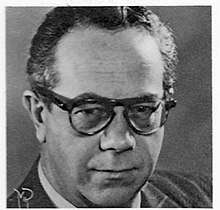Joel Berglund
Joel Ingemar Berglund, born 4 June 1903 i Torsåker, Archdiocese of Uppsala in Gästrikland, Sweden, dead 21 January 1985 i Stockholm, was a Swedish opera singer (Bass-baritone), director of Royal Swedish Opera and Hovsångare.
Joel Berglund | |
|---|---|
 Joel Berglund | |
| Born | 4 June 1903 Stockholm, Sweden |
| Died | 21 January 1985 (aged 81) Stockholm, Sweden |
| Nationality | Swedish |
| Occupation | Opera singer (bass baritone) |
| Years active | 1929–1968 |
Biography
Berglund read a note in Swedish newspaper Norrlands-Posten that you could get free singing education at the Royal Swedish Academy of Music in Stockholm, Sweden and for that to test singing. He was accepted and soon became one of Sweden's notable singers. He studied singing for Oskar Lejdström and John Forsell at the Music Conservatory in Stockholm 1922–1928.
In 1929, he had is debut as Monterone in Rigoletto at the Royal Swedish Opera in Stockholm. He often played in Vienna, Buenos Aires, Chicago, Berlin, Budapest and New York. Berglund won particularly great reputation as an interpreter of Richard Wagner's roles, including the title role in The Flying Dutchman, a role he also performed in Bayreuth .
He was the head of the Royal Swedish Opera in Stockholm between 1949 and 1956,[1] and retired from there in 1957. He then gave concerts and guest plays, and was active no later than the spring of 1968, as Philip II in Verdi's Don Carlos.[2]
Berglund was also active as a singing teacher. Edith Thallaug and Gösta Winbergh were some of his students.
References
- Klas Ralf, red. Operan 200 år – Jubileumsboken. Bokförlaget Prisma, Stockholm. sid. 241. ISBN 91-518-1287-8
- Sohlmans musiklexikon, band 1. Sohlmans förlag AB 1975.